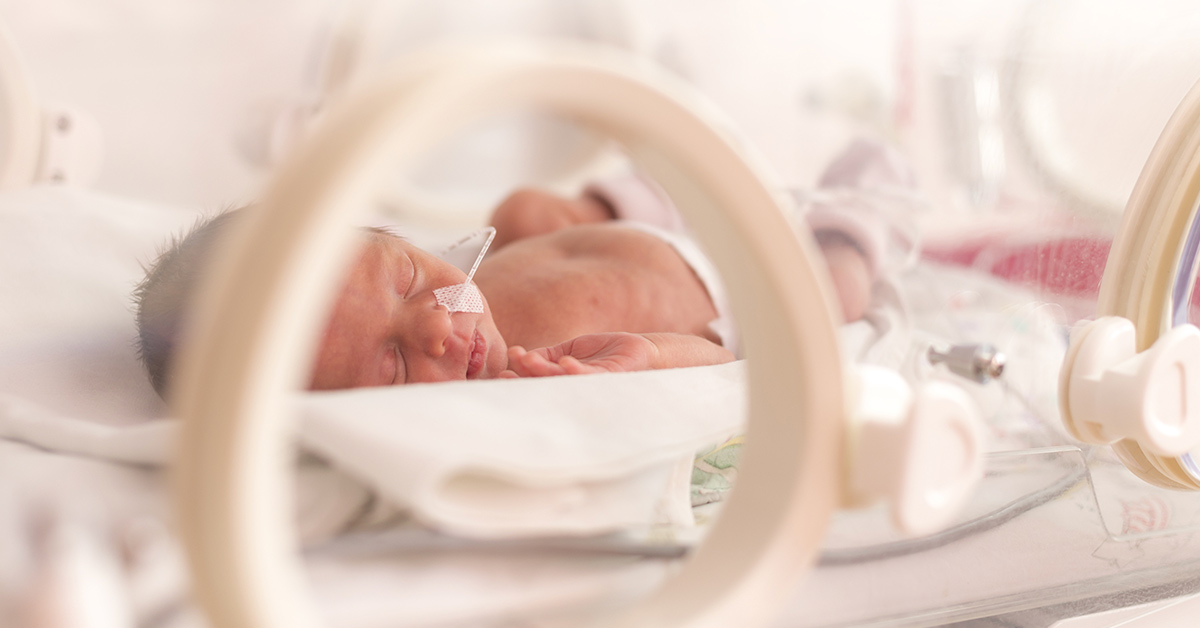Premature babies are any babies born before 37 weeks of pregnancy. If the baby is born at or before 25 weeks, they are considered extremely preterm. This was the case for baby Sofia, who, born at 22 weeks and four days of pregnancy, is Scotland’s youngest surviving premature baby. (1)
Baby Sofia Born At 22 Weeks Finally Goes Home
Baby Sofia Viktoria Birina was supposed to be born on February 1, 2021. Instead, she arrived four months early, on October 2, 2020. Born at just 22 weeks and four days of gestation, she weighed 1.1 pounds – little more than a loaf of bread. Able to fit in a human hand, the doctors gave her a 10% chance of surviving labor and an even lower chance after that. (1)
Nine days after her original due-date, baby Sofia finally got the green light to go home after 132 days in the neonatal care unit (NICU). (1)
Mom Egija and dad Inars couldn’t be happier to finally bring their little bundle of joy home.
“Everything was fine at the 20 week scan. Then just over a week later, I felt pain so I went into hospital and was told that I was already dilated and had to go into labour,” recalls Egija. “After 10 days’ bed rest our beloved daughter Sofia made an appearance. She arrived in the world with the biggest scream and was crying so much. We didn’t expect she would survive but that’s where our journey started.” (1)
Read: 70-Year-Old Grandma Wants To Retry Breastfeeding And Asks To Nurse Her Grandbabies
Four Months At The Hospital
Instead of spending four months growing inside the safety of her mother’s womb, baby Sofia spent three months fighting for her life in an incubator and another month still in the hospital. (1)
She was born so early that her skin was nearly transparent. In her first four months of life, Sofia has overcome (1):
- A heart defect
- Stage-one brain bleeds
- Retinopathy of prematurity (ROP)
- Many infections
She received seven blood transfusions and suffered from respiratory distress syndrome due to her underdeveloped lungs. Her lungs were so weak that the doctors put her on a ventilator so that she could breathe. (1)
“Sofia was literally the size of a hand, so fragile and small, and her skin was see-through. I had to wait a week to hold her for the first time because she was so fragile. Once I was able to hold her, they couldn’t get her out of my hands.” says Egija. (1)
Egija stayed by her daughter’s side for sometimes up to 16 hours each day, and Inars always came straight to the NICU after work. (1)
The medical team had to try six times over the span of many weeks to have baby Sofia breathe on her own without a ventilator. Egija says the first time; she lasted only 20 minutes before her heart rate dropped. (1)
“I felt like I was losing her – but the medical and nursing staff were great.” she recalls. (1)
Time To Go Home
After 132 weeks, baby Sofia was finally ready to go home. The tiny little fighter isn’t completely out of the woods yet, however. She still has a tube attached to give her extra oxygen, even while at home. (1)
She has follow-up checks until she is at least two years old, along with regular check-ups at a lung clinic for three or four years. Mom, dad, and doctors all say that she is doing well so far, and her development is on the right track. (1)
“Sofia has been doing great since we got home. She has the biggest and most beautiful smile on her face and is getting used to her new surroundings.” says her proud mom. (1)
Egija wants all moms in the NICU with premature babies to find inspiration in baby Sofia and not lose hope. (1)
Health Complications of Premature Babies
There are four classifications of premature babies (2):
- Late preterm (34-36 weeks of pregnancy)
- Moderately preterm (32-34 weeks)
- Very preterm (less than 32 weeks)
- Extremely preterm (25 weeks or before)
Not only is a preemie baby’s start in the world more traumatic and challenging, but there are several health complications they can experience. Some of these can be long-lasting, and others, such as learning or developmental difficulties, might not be noticeable until they are in school. (2)
Some of these problems include (2):
- Anemia
- Breathing problems
- Infections or neonatal sepsis
- Brain bleeding
- Newborn jaundice
- Necrotizing enterocolitis (severe damage/problems to their intestines)
- Heart problems
- Eye/vision problems
To be released from the NICU, premature babies must weigh at least four pounds, be able to regulate their own body temperature, gain weight steadily, breathe on their own, and breastfeed or bottle-feed. (2)
Though survival statistics, particularly for extremely preterm babies, can be grim, baby Sofia is an example that with a tremendous effort from dedicated medical staff, “miracles” can happen.
Keep Reading: This Image Shows Why Women Need Lots Of Time To Recover After Childbirth
- “Airdrie baby born at 22 weeks finally leaves hospital.” BBC. February 2021.
- “PREMATURE BABIES.” March of Dimes.

